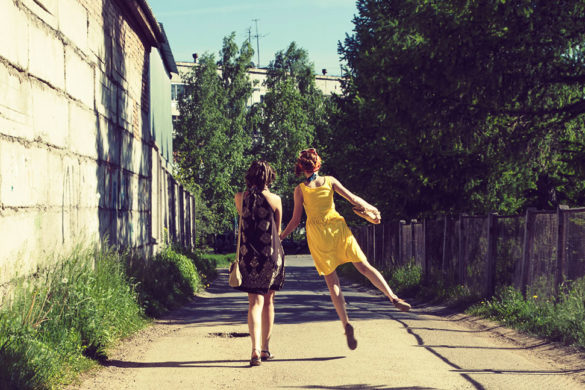Initially, it’s sort of confusing and surreal, this realization that you aren’t always going to be young. Like the first day you realized you might actually be a grownup. But more disturbing. On the other hand, it’s also kind of galvanizing. Once you are over that “no longer young” hump, you come to grips with some very clear choices. You can be one of those people who truly gets better – more beautiful, more vital, more evolved – with age. Or you can be one of those people who doesn’t.
When I look at my parents, I see models for the kind of older person I want to be. My mom is 60. She has always been a beautiful woman, but I think she is getting more gorgeous all the time. She still wears her wavy hair shoulder-length, and the broad, silver streaks running through it now make her look kind of witchy and mysterious. She’s an active gardener and farmer with a booming reflexology practice, and she and my stepfather are planning a long biking and walking trip through Europe this fall. They both read voraciously and have about a dozen interesting projects going on at any given time.
My dad, a professor, is just retiring at 72. People say he looks like a shorter, more Greek version of Sean Connery. He has a recumbent exercise bike in his living room, spars regularly with a karate group, and splits wood whenever he has the chance. When he isn’t planning trips to a primitive cabin on the edge of the Boundary Waters, he’s working on quirky academic projects, planning “film nights” at friends’ houses, or trying to pare down his dangerously large (and enviable) collection of books.
My parents are aging well, and I’m taking a lesson from them. Both spend a lot of time outdoors, have rich networks of friends and family, and keen interests. They take good care of themselves physically (they’ve both been taking vitamins for decades, eating well, getting proactive, natural health care and lots of exercise). But more importantly, they both have a lot of life force and purpose. They are interested, open – accessible to possibilities. They don’t care too much about money. They don’t hold a lot of judgments. They consistently challenge themselves, and pursue whatever intrigues or energizes them. As far as I can tell, their lives keep getting bigger and richer with each passing year.
I have another model, too: Ruth Gordon’s feisty character in the film Harold and Maude. There’s a great scene where you see Maude walking alongside a group of funeral mourners in the rain. Everyone else has a black umbrella and a slow, somber gait. Maude, who’s just turning 80 in the film, has a bright red umbrella and the bobbing, energetic step of a young girl. The visual contrast is striking. So is the underlying message: You’re as alive and as vital as you feel.
Throughout the film, Maude counsels Harold – a depressed, semi-suicidal 18-year-old who falls in love with her – on how to embrace life with passion, purpose and pleasure. Some of the film’s major themes concern life choices: deciding who you want to be, how you want to live, how you choose to respond to life events.
In my mind, the prescription for vitality – at any age – comes down to a combination of will and grace: the will to make decisions, choose goals, discern courses of right action, and then have the discipline and integrity to carry them out (something I keep in mind whenever I am doing one of Chris Clark’s nightmarish hill runs – see page 98); and the grace to accept that not absolutely everything is within our direct control (as all those little fine lines attest).
Anyway, we’ve developed this issue of Experience Life with all these things (plus the best anti-aging advice we could dig up) in mind. Hope you enjoy it!

